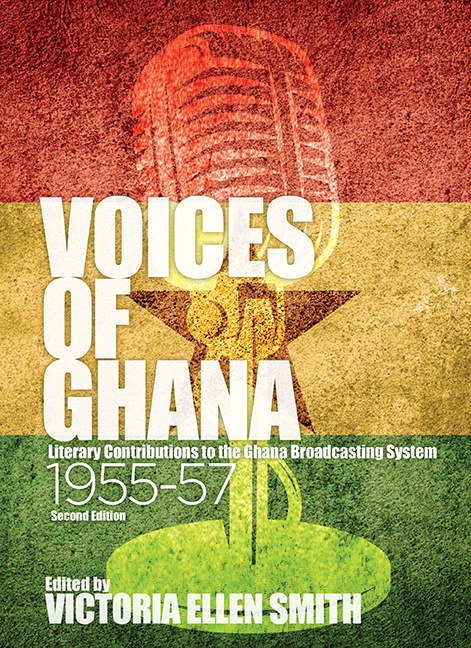Preface to Second Edition
Published online by Cambridge University Press: 02 August 2019
Summary
I feel privileged to have been asked by the Editor to write the Preface to this second edition of Voices of Ghana. As an academic of the Arts and Social Sciences persuasion, I have always argued that the Arts and Social Sciences are crucial for the development of society. It is the arts that give symbolic expression to our ways of life and give vent to who we are. It is unfortunate, then, that their role has been downplayed in recent years. This volume is a major contribution to the revival of the arts. It offers us the opportunity to relive the rich cultural past, when the promotion of arts and culture was at the centre of the national broadcasting agenda. This anthology is a rich collection of history, art, poetry and culture. It takes us to the days when the Ghana Broadcasting Corporation (GBC) was the only media outlet in Ghana. In those days, the promotion of our local languages was very much a part of the broadcasting agenda and people who listened to radio were fed with educative material that both enlightened and entertained.
It is to the benefit of our time that Victoria Ellen Smith edits this second edition of Voices of Ghana (first published in 1958) for the benefit of the present generation of Ghanaians. In reviewing the first edition in 1958, the famous Nigerian writer, Cyprian Ekwensi, stated that Voices of Ghana ‘stands as a solid examination of the achievement of a nation under the inspiration of a man who knew the importance to a nation of the (literary) printed word’. In years gone by, storytelling under the moonlight was a feature of the evenings of every village, town or community. These stories, with Ananse (spider) as the principal character, mirrored the moral philosophy of our society. They taught the virtues of honesty and integrity. These stories taught us that a good name is better than silver and gold. Today, these values are being stood on their head. Today, the tendency is to make money, irrespective of how it is made. The existence of illegal mining, popularly called galamsey, demonstrates that people are prepared to jeopardise the collective future of the Ghanaian people for their own selfish gain.
- Type
- Chapter
- Information
- Voices of GhanaLiterary Contributions to the Ghana Broadcasting System 1955–57, pp. xiv - xvPublisher: Boydell & BrewerPrint publication year: 2018

